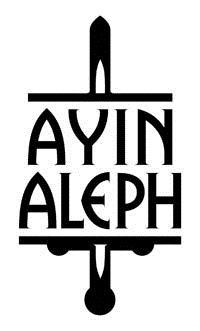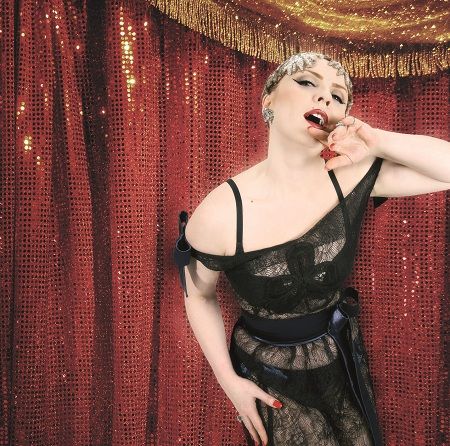
Interview by Ed MacLaren

Every once in a while an artist comes along that defies description, challenges convention and polarizes the listening public – like all great musicians should. Ayin Aleph’s singular combination of metal, goth, and the classical culminates in a unique musical viewpoint that is at the same time attractive and repulsive. Her first album, “Ayin Aleph I”, goes for the emotional jugular in full metal splendor while her recent “Ayin Aleph II” re-interprets much of the album in a more classically-based but equally chaotic manner. Recently, Femme Metal got a peek inside the fertile mind and imagination of Ayin Aleph.
It’s been two years since “Ayin Aleph I” and you’ve recently followed it up with “Ayin Aleph II” – an acoustic album of sorts – with piano and harpsichord versions of the tracks on your first album. What was the genesis of this idea?
I had a few ideas. Firstly, I wanted to show that metal music can sound in a grandiose and immense way on a classical instrument without the electric effect (saturation and distortion) but of course in another sounding aspect and in another expressivity type. Secondly, I wanted to enlighten all the tracks played by the instruments of the metal band. (You know clearly that with distortion and saturation it’s hard to hear clearly all the precise shapes of the melody.) My piano parts are playing the guitar and bass parts and sometimes even the pictures of some drums parts (percussive piano). Thirdly, I gathered all the choirs and songs into a monolith in order that it sounds like an drawing of a mini metal opera with an evolution of emotions that is the only topic: that means that this allegoric sense starts with the big choir and first song (the smallest in terms of sound effect) then the second song becomes bigger and more developed in terms of arrangement. All that evolves into a culmination and ends with a “soft death” of divino-diabolical emotions and with regrets about the future.
“Ayin Aleph I” is an elaborate album with layers and layers of densely structured harmonies and melodies. While “Ayin Aleph II” is not as intense, there is still a chaotic element that threads though much of the music on both albums. At the same time it feels natural and integrated. How does your music evolve from concept to completion?
It evolves like each suffering: at the beginning it is a shock because of something new that goes through your existence spontaneously like a bullet; the “swimming” period in some spheres with the hopes to find the source of that; and the tragedy of despair and love into eternity. All that is like inside life: of course it is highly intensive. Even if the musical period is less intensive, this strength is hidden simply in the depth in order to have its blast just after.
You see an affinity between metal, opera and baroque chamber music. What gave you the idea to integrate these musical forms and how did you know that it could be done so successfully?
I do everything myself on the level of inspiration. All the elements and musical norms are gathered between each other alone, like my music is asking for it. I do like it asks without digging into an analysis of the musical form or style. I am sure that all music cannot be “from” someone, even from its creator. I think that each creator is only a workman of inspiration that is coming down on behalf of Heaven.
With that said, “Ayin Aleph II” focuses more on the acoustic side of your music – “Ayin Aleph unplugged” so to speak. Your vocals are brought to the front and the music is softer while retaining its distinctive edge. If “Ayin Aleph I” was made for the avant-garde metal heads out there, who is the audience for “Ayin Aleph II”?
A much larger public. Because the sonority of metal belongs only to metal and the hard rock public. For the rest of the people this kind of sonority is not possible. I did this record like a transcription of my metal music. For me, in music, the first and last thing is melody. If someone doesn’t accept the saturation or distortion, I can easily do without it which means denude my music and show it to the public that hates metal or rock with all the ingredients that are composing my metal cake. My metal public like this album no less than the first one. I also enlarged my public with the gothic-classical public and some jazz fans.
The trill in your voice gives you one of the most recognizable voices in metal. It can morph from a sultry whisper to a shrill cry instantly. There is such conviction and versatility in your vocals and you maximize the emotional impact on every track. How did you develop such a unique vocal delivery? Does it augment your music in a way that traditional operatic vocals wouldn’t?
Of course, I don’t sing in an operatic way except the very sharp notes where it is not possible to sing with my natural voice. In sharp sonority, if you don’t sing with the head voice it is impossible. The vibrato of opera is essential: remember Freddie Mercury. The rest are only emotions that express with the means of the notes. I use my voice more like an instrument but not like a singer. My vocal sense evolves alone linked with the music and its requests. The idea is such: I search with my voice for the right musical expression that (sometimes very strangely) corresponds to the emotion involved. Of course, in opera there are too many codes and laws. It is divinely beautiful but this universe exists with a certain part of the public: a little elite of professionals or opera amateurs, but I, as a singer, exist for a much larger public and I search for the means of a direct liaison with those people.
Your music has such a theatrical aspect to it that it craves a visual component to complete the listening experience. The meticulous detail and staging in your videos and stage shows look to be so integrated with the music that in some ways listening to the music alone is incomplete. Do you compose with that visual performance component in mind or is the music meant to stand on its own?
My music is, of course, very linked with my visual realizations but all my videos are my sole point of view on this music. But with another individual that is listening to my music without watching my video can have completely different visions linked with his own experience and knowledge of this world and with his own luggage of emotional sensations. Here is my music. It exists completely without the videos in order to give the possibilities to each of us to create its own visual universe.
You project a strong sexual image in your videos and promotional materials but it doesn’t feel like it’s done in a gratuitous manner. We see you at times dirty, bloody and disheveled but you always maintain a potent sexual aura. What role does your sexuality play in expressing yourself musically and in the visual presentation of that music?
Not a very big role. But I think there is a blink of the eye at the very first moment. But for me it is an allegory of the human sin. All people observe beauty very quickly but at the same time don’t want to understand the source of this beauty by transforming it into vulgarity. Vulgarity kills this sense of beauty. The source of exteriorized attraction and the beauty are simply love. But not the stupid use of this love like a satisfaction of low physical envies. Love and beauty like the consequence of this love disappear forever… And I yell into the space about that in all my videos.

Your lyrics contain the same detail and potent imagery as your music. Does the music infuse the inspiration for the lyrics or viceversa? How do they serve each other in context of your overall musical vision?
Of course, music gives birth to all my lyrical characters. It’s like the lyrical drawing of all my sufferings and their history, mixed with my cerebral remarks. With the tools of my lyrics, I explain not only the mood or the subject.With them, I help go to the depth of emotions and you definitely know that emotions and sensations give birth to this sublime substance: music.
It’s difficult to discuss your music without touching on the reaction it arouses. When your name comes up with metal fans there are generally only two reactions: love or hate. There is no ambivalence towards your music. It gets a strong polarized reaction – which is rare thing. Is it simply a matter of taste or are the detractors just missing something? Does it even matter if they love it or hate it as long as you achieve a reaction?
I know that people either love me or hate me and that’s the same with my music. For me the people who hate exist in two categories: the ones that don’t understand and they are disturbed; the second category understand everything and it’s normal that they hate me because for human nature it is normal to love weakness – something lower in order to feel its own existence. The strength and beauty (of course I don’t speak about myself) call only for love from individuals that have the beauty of soul and body and, of course, from individuals less strong and beautiful it’s called jealousy. That is completely normal and about that I speak a lot in my videos. To love everybody and everything is not possible. Each person has his own taste, his color of love, his state of mind and his level of strength. To not understand is possible but the hate at the end kills the one who hates. If you don’t like something, don’t take it. Take something that is compatible with the chords of your soul and believe me you will not have the time to hate something.
Your music shares many musical ideas with the American musician Tom Waits. He hijacks traditional music forms, strips them of convention and injects a disorder and mayhem that creates a glorious musical noise that is only identifiable as his. His raspy vocal delivery is legendary as well. How important is it to evolve the musical form and push the boundaries of musical expression as an individual?
For me, Tom is an actor inside music. But me I am a musician inside cinema. It means that I do music and then I am transforming myself as she requests it from me. If this music takes or changes the expression or the shapes, I change as well in the same way and I hope that you can see that in my videos.
You go to great efforts to create a complete visceral experience for the listener. Is it more important to respond to music from and emotional level or an intellectual standpoint?
Only with the means of emotions: the highest in art was born from the emotion that sourced this envy or another envy. The envies have built that. The intellect can only do a very primitive and materialist analysis of the emotions.
In the movie “Bill and Ted’s Excellent Adventure”, Beethoven is kidnapped by two teenage time travelers and brought to the present. At one point they leave him alone in a music store and return to find him gripped in fervent compositional rapture using synthesizers and other modern instruments. Your music could have just as easily been used in that movie. Does that scene resonate with you at all? Do you have an attraction to taking older music and amplifying idea and form through modern technology?
‘My music worn in a form of song is, of course, a music of cinema.
Your music can be a challenging listen for the uninitiated. What advice do you have for people who want to understand your music better who might not have the frames of reference?
Clean your eyes, clean your ears, understand what you like and what you don’t like, exist in the place that you correspond to with the people that you like. Stop lying to your own soul because only your soul knows what is convenient for you and what is not. Throw out the concept “I must”. Don’t wear the shoes of others. The word “I must” should be changed to “I love” or “I like”. Gather your pains with my pains, for instance, and you could see my music in a very different way. The point of view can change each time but your envies – like an expression of your love – will never change.
You have mentioned in the past that you’ve been working on a metal opera and a metal requiem. Are there any new developments or surprises in those areas? Is there an “Ayin Aleph III ” looming anywhere on the horizon?
I already have some songs for the new album and some drawings for the video and the music of my metal opera.
With the contrasting styles of “Ayin Aleph I” and “II” and interacting with the crowds at your live shows, who do you see as your core audience?
The metal, gothic and classical public.
(Famous) last words?
Be in love or fuck off and die.
Links
MySpace * Facebook * Twitter * Site
Latest Multimedia